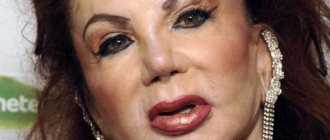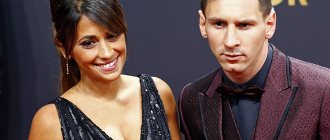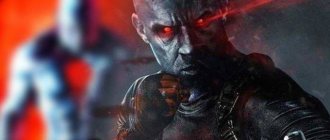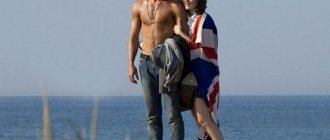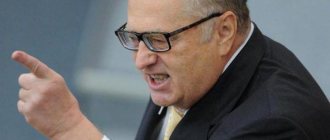Biography
Since 2011, the nickname Golden Boy has firmly stuck to footballer Mario Götze. It is not surprising, since the athlete is considered the youngest scorer of a goal in the World Cup final since 1966. The attacking midfielder has been named the most expensive German player after Mesuta Ozil. The young man annually donates part of his income to help children in Nepal and Cambodia. The “golden boy” not only has talent and an impressive bank account, but also a heart of gold.
Childhood and youth
Mario's biography originates in the city of Memmingen, located in the lands of Bavaria. The boy was born on June 3, 1992. The child became the second son of the Goetze couple - a housewife and an engineer. Later, another child appeared in the family. All 3 brothers were fond of football from an early age and kicked the ball together in the yard of the house.
Football player Mario Götze
When Mario was 3 years old, his parents sent the child to the local Ronsberg youth club, where the boy learned the basics of his favorite sports game. In 1998, when Mario was barely 6 years old, the family moved to Dortmund - his father was offered a position as a professor at the local university.
Despite noticeable changes in life, Götze did not give up football. Over the next 2 years, Mario honed his skills at the little-known football club Eintracht Hombruch.
Mario Goetze with his father and brothers
And in 2001, after one of the usual training sessions, a scout approached Mario and invited the teenager to try out for the Borussia youth team.
At the trial training, Götze showed everything he had learned. The Borussia management did not hesitate to invite the young football player to the team and closely monitored the athlete’s success for the next 8 years.
Who is Mario Götze?
Mario Götze (born 3 June 1992, Memmingen, Germany) is a German footballer who plays as an attacking midfielder for Bayern Munich and the Germany national team.
Having moved to Dortmund at the age of six from Munich, Mario began to demonstrate enviable composure when handling the ball in his first training sessions. The German youth football player has all the makings of a first-class dispatcher. He is capable of escalating the game at any moment with a brilliant pass, as well as single-handedly resolving an episode at the opponent’s goal. With top-notch technical skills and versatility, Götze is capable of playing in three attacking midfield positions. The 176 cm tall midfielder does not get lost even under heavy pressure from the defenders. Interest in the young man from fans and the press is so high that the club temporarily banned any interviews. Since April 2012, he has been dating German model Ann-Katrin Brömmel.
Playing style.
Götze is a typical number ten. Götze's enormous potential is also evidenced by the prestigious Fritz Walter Medal, awarded by the German Football Association to the most talented young footballers. By the age of 18, the black-and-yellows player had been awarded this award twice. In order not to stop growing, young football players, in addition to professionalism on the field, need to demonstrate impeccable behavior off it. In this regard, Götze can serve as a role model. He, by his own admission, is indifferent to cigarettes and alcohol, which reveals in the German a mature athlete beyond his years without signs of star fever.
Season 2013/14
Götze made his debut for Bayern on August 24, 2013 against Nuremberg, which Bayern won 2-0. Götze scored his first goal for Bayern in the Champions League against Czech Republic's Victoria, as Bayern secured a massive 5-0 victory. Moreover, he scored an assist for Bastian Schweinsteiger, so Bayern won the Champions League in the group stage. In the 1/8 finals, Bayern faced Arsenal London. In the first match in London, Bayern easily won 1:3. Mario played all 90 minutes, but did not distinguish himself. The first goal in the German Championship was scored against Hertha Berlin; Mario came on as a substitute for Toni Kroos in the 25th minute. Bayern snatched a 3:2 victory. In the 2013/14 season, under new Bayern coach Pep Guardiola, Mario did not feature as often as he imagined, but he will fight to get into the first team. To do this, he will have to earn the trust of Pep Guardiola.
International career
Mario was one of the key players in the U-17 team. The game of this German team was heavily tailored to Götze. The team played virtually without flanking midfielders, and under Götze there were three mobile central midfielders at once, two of whom skillfully switched from defense to attack. Thus, it was possible to keep two forwards on the field at once. It was not for nothing that Götze evoked a remarkable similarity in his playing style with Diego. The team’s play pattern, typically Werder’s, played a large role in the formation of this opinion. In 13 matches for the team, Mario managed to score five goals and seven assists.
Götze made his debut for the main German national team on November 17, 2010, in a friendly match against Sweden. After the debut match, Mario said: “ Even though I spent 12 minutes on the field, playing for the national team is an invaluable experience for me. I had no shortage of heart palpitations, but I’m very glad that I took part in this game.”
. The German scored his first goal for his national team on August 10, 2011 in a friendly match with the Brazilian national team, in which the German national team won with a score of 3:2, thereby Mario rewrote history, becoming the youngest player ever to score for the Bundesteam on the day capture of the Brazilian goal (August 10) Mario Götze was 19 years and 68 days old.
And today Mario Götze is the most famous person in Germany.
Football
Mario made his debut as a full-fledged Borussia player in 2009. The young man was released onto the field in the match against Mainz in the 88th minute. Until the end of the season, the rookie was called up from the bench 5 more times, and each time at the end of the game.
Mario Gotze at Borussia Dortmund
The next season became more fruitful for Götze. The attacking midfielder scored 6 important goals and attracted the attention of the national football federation. In 2010, Mario was called up to the German national team. Until this moment, the young man actively participated in the fate of the youth team, but an invitation to the adult team brought Götze to a new level.
Realizing that changes are needed for career development, Mario agrees to move to a new football club. The choice fell on Bayern, and on April 23, 2013, the footballer signed a contract. All parties to the deal benefited from Götze's transfer.
Mario Götze at Bayern Munich
Now the midfielder's salary was € 7 million per year, and Borussia received compensation in the amount of € 90 million. Only Borussia fans were dissatisfied, who accused Mario of betrayal.
2014 was a truly stellar year for the football player. At the World Cup, as a member of the German national team, Götze entered the field against representatives of Argentina and scored a goal that brought the team victory in the final. Throughout the championship, Mario scored the ball against the opponents three times.
Mario Gotze's best goals
By 2020, cooperation with Bayern began to bring discomfort to the football player. The club's management, who expected more activity from the new player, began to express dissatisfaction with the athlete's athletic form and constant injuries.
By the beginning of 2020, Mario returned to his native Borussia. The new contract is valid until 2020. Particularly important to Götze's return was Marco Reus, a close friend and teammate whom the footballer met as a teenager. The young people were supposed to take the field together at the 2014 World Cup, but Royce was injured. After scoring a goal in the final game of the championship, Mario unwrapped his friend's T-shirt in front of the journalists' lenses.
Mario Götze in the German national team
In February 2020, a wave of criticism hit the midfielder again. Football fans were unhappy with Götze's athletic form. The athlete was reminded of constant injuries, due to which the young man often missed important matches. Everything calmed down after the Borussia management announced that Mario’s condition was to blame for his illness.
No one has officially confirmed a specific diagnosis, but the public is confident that Mario suffers from myopathy - a metabolic disorder. Journalists and analysts predicted that Götze would soon retire from his career, but in June 2017 the midfielder resumed training under the supervision of doctors.
The rise and fall of Mario Goetze. What happened to Germany's "golden boy"?
He was an outstanding young talent who was tipped to be among the best players in the world, but in the end pressure, fame and other circumstances turned him into just another mediocrity. Football knows plenty of such examples, but the story of Mario Götze is one of the brightest in such a scenario. From a very young age, the midfielder was given the nickname “Golden Boy”, which also became his burden as the years passed. The main hope of German football is now only 27 years old, his contract with Borussia D is coming to an end, and there are only illusory hopes of resuscitating his career ahead.
How did it all begin?
Götze is an example when natural talent finds the very coach who can fully reveal it. It was Jurgen Klopp, whom Mario himself calls his football father, who was able to discern the player’s enormous potential, and the ability of an emotional specialist to work individually with football players played a key role. Can we say that it was Klopp who gave the world Götze? Yes, it is quite. Of course, this in no way diminishes the midfielder’s merits.
By the age of 20, the midfielder had already become one of the key players in champion Borussia in the 2010/11 and 2011/12 seasons. Obviously, top clubs immediately formed a queue for the right to get the player into their team, and the foreign press, naturally, had already given the player the title of “new Messi.”
In the spring of 2013, Götze takes a rather serious and scandalous step. Two months before the opening of the transfer window, the midfielder signs a preliminary contract with the Bumblebees’ main rival, Bayern. The club, despite the competition with the “Reds”, was contentedly rubbing its hands, since the transfer amount was 37 million euros - a record price paid for a German footballer at that time. Mario said that moving to Munich was a step forward in his career, but for Dortmund fans, the team’s graduate and main young talent immediately became a traitor. This will come back to haunt us in the future.
Karl-Heinz Rummenigge, to highlight Götze's value, stated that Bayern chose him over Neymar, who was then competing with the German for the title of most promising young player. The footballer himself came under Guardiola, with whom he was so eager to work. By the way, the first season at the Allianz Arena turned out to be very decent - 15 goals and 13 assists in 45 matches. Everything was going very well for Götze, and the 2014 World Cup awaited him.
On the fields of Brazil, as it turned out in the future, 22-year-old Götze found the peak of his career. The midfielder started the World Cup as a starter for the Bundesteam, but towards the decisive stages of the tournament, Lev sat the midfielder on the bench. However, this did not stop Mario from making history in Germany. Now let's remember how this happened.
In the 88th minute of the final match against Argentina, Mario entered the Maracana field, and in extra time he scored the only goal that brought his team the title of world champions. The status of “Hero of the Nation” was added to the “Golden Boy”. From that moment on, the football player's career went downhill.
Something went wrong?
Perhaps at that time it was impossible to imagine a player who would be under such pressure. You play for the strongest club in the country, they paid a record amount for you, as for a German, and you gave your team victory at the World Cup. Götze could not cope with such a load, but everything happened gradually.
Immediately after the World Cup, the midfielder secured his place in the Bayern team, but noticeably declined in the second half of the 2014/15 season. Mario’s performance was so unimpressive that the legendary Beckenbauer began to criticize the midfielder: “Sometimes Götze seems to me like a child who, having lost the fight, continues to stand still.” The German media, in turn, actively reported that Guardiola had lost confidence in the player. Over time, Götze himself went after Pep, saying that the Spaniard only cares about tactics and schemes, and he doesn’t care about individual work with players.
It only got worse from there. Götze's performance declined and injury problems began to arise. The competition in Bavaria does not allow such mistakes, and the midfielder spent the 2015/16 season as a reserve player. His former club, Borussia Dortmund, began to save Mario’s career.
In the summer of 2016, the football player returned to Signal Iduna Park, and it would seem that this is the ideal option to re-establish himself within his own walls. But the fact is that the walls of the Dortmund stands ceased to be like home for the midfielder, because the fans could not forget his betrayal three years ago. Fans greeted their “Golden Boy” with banners “Go to hell, Götze!”
He was not welcome at home, and apparently this affected the player’s psychology, as evidenced by the extremely lackluster start to the 2016/17 season - one goal and one assist in 10 matches. Then Mario's career suffered a severe blow - the footballer faced serious metabolic problems, which caused him to actually miss the entire second half of the season. Götze returned in the next game, but he was catastrophically far from optimal physical condition - the midfielder dropped out of the game more often than others, not bringing any benefit to the team from match to match. Naturally, the fans blamed him not least for the general failures of the Bumblebees that season.
The hero of the 2014 World Cup was left out of the national team at the 2018 World Cup. Was anyone surprised by this? No. And if back in the 2018/19 season, Götze more or less regularly entered the field, spending an average of 64 minutes per match, then Borussia’s summer acquisitions did not leave Mario any chance for the current competition. The midfielder spent a total of 596 minutes on the field in 19 matches, scoring three goals and giving one assist.
He completely loses the competition in midfield to Brand, Hazard, Sancho, Royce, Can or anyone else. And if Favre in the first half of the season from time to time released Götze as a center forward, the arrival of Haaland deprived him of this function. The "Golden Boy"'s career in Dortmund is irrevocably coming to an end.
What's next?
In today's crisis, it is quite easy for Mario to find a club, because he has an important transfer advantage - he does not have to pay to buy him. His form is unlikely to allow him to demand a “fat” contract: no one will pay him the 10 million euros he received in Dortmund now. Perhaps only the Chinese.
The media report active interest from Italian clubs, because the financial situation in Serie A leaves much to be desired. First of all, they name Roma and Milan, but authoritative media claim that even they are in no hurry to start negotiations. The Germans write that there is interest from Bayer, or Mario could become part of Hertha’s new project. We haven’t heard about the English clubs where the player has been wooed for many years.
Be that as it may, Götze is only 27 years old. Yes, there are huge doubts that we will ever see him in leading roles in a top club, but he is quite capable of becoming an important player in a team of the caliber of Hertha or Milan. Without a doubt, leaving Borussia is a chance to start over with a clean slate. A chance to understand what went wrong. Rummenigge, who then arranged Götze's move to Bayern, also believes that only the player himself can find the answer.
“I wonder: “What happened? What happened to a player who could demonstrate such a level on the field?” But I don't have the answers to these questions. Probably only Götze himself can find them."
Anton Rybakov, Football.ua
Personal life
Mario met his girlfriend in 2012. Ann-Kathrin Bremmel, a popular fashion model, was relaxing with her friends in a nightclub in Düsseldorf, where Goetze dropped in with friends. The young people liked each other and spent the evening having a lively conversation.
Mario Götze and his girlfriend Anne-Katrin Bremmel
Three months later, the football player and the model went on vacation to Ibiza. Since then, the lovers have separated only during work trips. In one of their many interviews, the couple stated that they are not yet ready for family obligations or children.
The most interesting
TOP 9 Hollywood actresses with non-standard appearance (10.01.2018)
Actresses who mutilated themselves for the sake of a role (12/06/2017)
Fans’ interest in this couple is fueled by controversial photographs that were published on the personal pages of the stars on social networks. In these frames you can see gentle touches, reverent glances, etc. It is interesting that the artists themselves categorically refuse to comment on this situation. Questions regularly appear on the Internet, for example, who is Sam Heughan’s wife and whether he has children. All these questions are based solely on the uncertainty of the filmmaker himself.
The actor never ceases to note that his heart is still open to serious relationships; he is ready to become a wonderful husband and loving father. Moreover, he wants the first child in his future family to be a girl.
Mario Goetze now
Due to a metabolic disorder, the football player was unable to quickly return to his previous athletic form, so the coach of the German national team did not include Mario in the team that went to the 2020 World Cup. On his Twitter, the young man expressed regret about missing such an important event and wished good luck to the players who went to Russia.
In June 2020, it became known that two football clubs were interested in the football player - Götze could become a transfer target for Tottenham and Marseille. Analysts claim that Borussia intends to ask for at least €18 million for Mario.
Mario Götze in 2018
Götze himself expressed hope that he would be able to train again under the leadership of Jurgen Klopp (former Borussia coach), who now works at Liverpool.
While the future fate of the athlete is being decided, Mario and his beloved visited Milan Fashion Week. However, social events do not prevent the football player from training, making easy mountain climbs and regularly posting personal photos on Instagram, as well as advertising brands with which the young man has commercial contracts (Nike and Powerade water).
